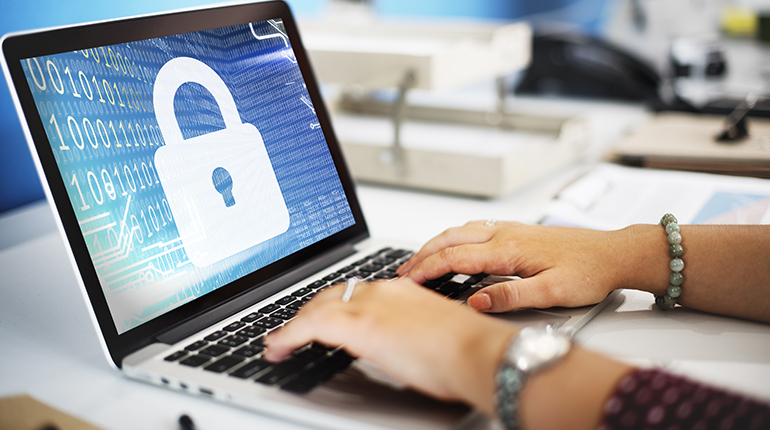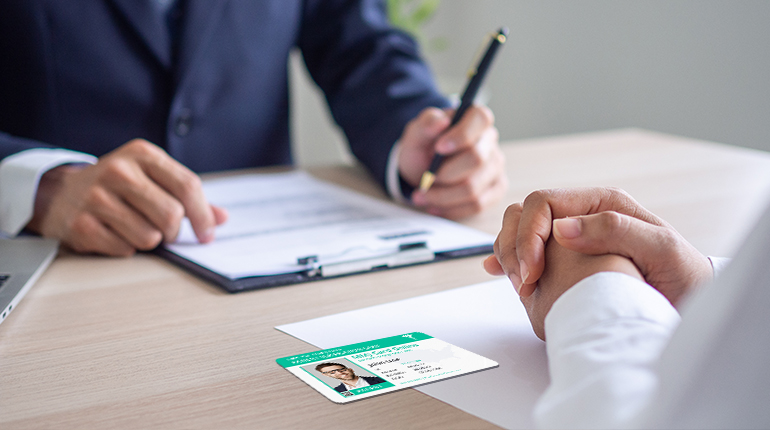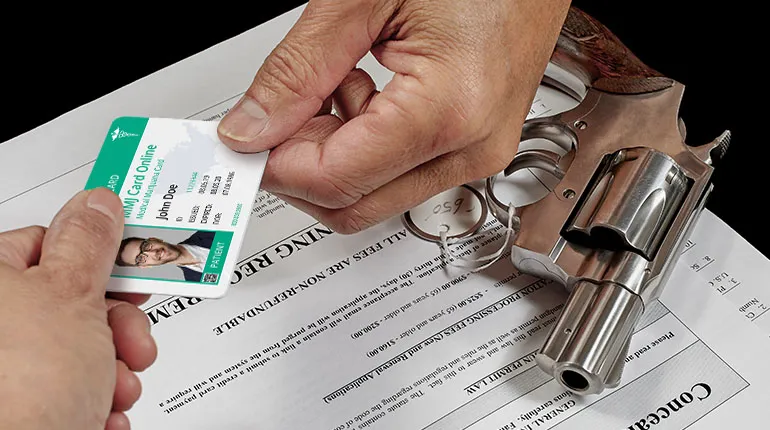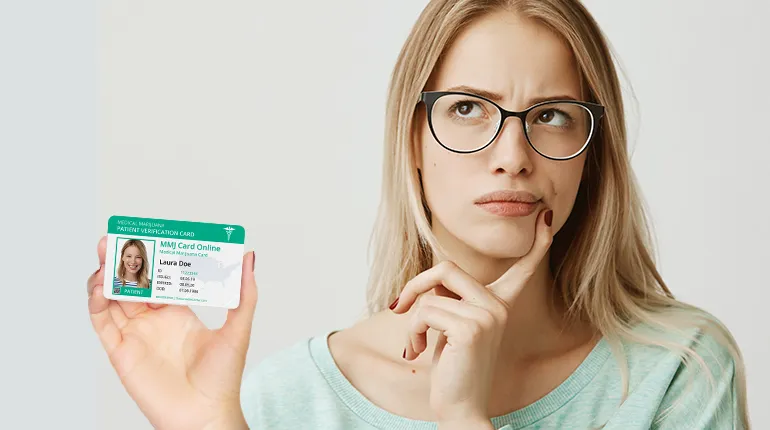Who Can See If I Have a Medical Marijuana Card?

Although medical marijuana is legal in a growing number of states, it remains a federally prohibited substance. The Controlled Substances Act of 1970 classifies marijuana as a Schedule I drug; therefore, having an MMJ card could disqualify you from certain forms of employment, housing assistance, owning a gun, or having a commercial driving license (CDL).
Clearly, there’s a lot at stake when deciding whether to apply for a medical cannabis card.
Who knows if I have an MMJ Card?
Thanks to HIPAA, very few entities will know about your medical marijuana use without you telling them. However, you aren’t guaranteed complete secrecy. This article outlines who can see whether you have a medical marijuana card, and what implications this might have on employment, background checks, health insurance, government assistance, firearm ownership, and more.
Worried About Your Medical Marijuana Use Being Discovered? HIPPA to the Rescue!
In a nutshell, the HIPAA (Health Insurance Portability and Accountability Act) regulations of 1996 ensure patient’s medical records have a huge degree of protection and privacy. The act contains a raft of data and security privacy provisions that keep medical and healthcare-related information under wraps.

Below, we answer some FAQs relating to whether medical marijuana can show up on background checks and other scenarios. First, let’s learn more about the medical professionals permitted to view this information.
Will Healthcare Providers Know I Use MMJ?
Generally speaking, yes. Doctors and healthcare providers will be able to tell via your medical records that you were approved for a medical cannabis card. This is because the MMJ application process requires applicants to receive written certification from a doctor before they can be approved for medical marijuana. The recommending doctor must document the patient’s qualifying condition as part of the consent, and this will be included in your permanent medical records.
How Else Could a Doctor Know I Use Medical Marijuana?
In some states (not all), details about your medical cannabis purchases are uploaded to a prescription monitoring program (PMP). Doctors are legally required to check the PMP registry and look at your medical history before prescribing medication for any condition.
Therefore, if you need a prescription medication, the prescribing doctor will probably be able to see that you are a medical cannabis patient. Of course, a medical professional has no reason to check the PMP if they are not prescribing a drug.
Should I Keep My MMJ Use Private from Healthcare Providers?
This is completely up to you. As we’ve answered above, your doctor will likely be able to see that you’re a medical cannabis patient once they look through your medical records. In any event, if you’re a legal MMJ patient, there is never any reason to lie and tell a healthcare provider that you do not use cannabis.
Marijuana can cause major and potentially dangerous adverse effects in certain individuals when combined with some prescription drugs. If a doctor doesn’t know you use marijuana, they could inadvertently prescribe a drug that causes serious harm and adverse side effects.
Who Else Can Find Out If I Have a Medical Marijuana Card?
Now you know that medical professionals, in most instances, can see that you are a medical cannabis patient. What about other entities? How does having a medical marijuana card impact certain rights?
Let’s find out with the FAQ below.

Will My Medical Marijuana Card Show Up on a Background Check?
The quick answer here is ‘no.’ HIPAA ensures that background checks won’t pick up on the fact you use medical marijuana, since this is part of your protected medical record.
Additionally, state officials can’t obtain information about your medical cannabis card, nor can they provide information to potential employers. There is no legal way for a potential employer or landlord to access your medical records, without your express permission.
Also, since your MMJ card doesn’t contain your social security number, dispensary staff won’t learn anything about your health or personal information.
Therefore, your employer won’t know anything about your medical marijuana usage, as they have no access to your medical records. Indeed, even doctors that are affiliated with the hiring company cannot share information about your MMJ usage, thanks to HIPAA privacy laws.
Will An MMJ Card Show Up on a Federal Background Check?
No, your medical cannabis card will not show up on a federal background check. This is thanks to HIPAA medical record privacy laws. There are, however, other ways for this information to come to light. For example, a federal background check will uncover an individual’s criminal record. Therefore, if you have a marijuana possession conviction that hasn’t been expunged, this will likely show up on the background check.
Could I Lose Custody of My Children if I Use Medical Marijuana?
The simple answer here is ‘no’ – you can’t lose custody of your children just because you are a medical cannabis patient. Again, your medical records are protected under the HIPAA privacy act, meaning Child Protective Services (CPS) will not be able to see the fact that you are a medical cannabis patient.
However, there have been countless instances of CPS requesting a drug test during parental investigations. It’s important to note here that while the CPS is allowed to request a drug screening, the parent can say ‘no’ without risk of losing custody of their child. When asked for a drug test by Child Protective Services, the parent or guardian must voluntarily give permission. In other words, a CPS investigator can’t make threats such as “take the test, or you will lose your child.”
In the event that a parent does refuse a drug test, CPS will need to get a court order that forces you to comply with the drug screening. In this instance, a refusal would mean the agency can take your child away. If you voluntarily agree to take the test, CPS must prove you agreed to the screening. However, once you agree, there is no going back, and a positive result could have implications on parental custody.
Can I be Denied Health Insurance if I’m a Medical Marijuana Patient?
Health insurance companies are private entities, meaning they can refuse coverage based on their own policies. However, in most instances a health insurance company cannot access your medical records (thanks to HIPAA), meaning they won’t be able to see on their own that you’re a medical cannabis patient. They can, however, request that you provide them with medical records before they can consider you for health insurance coverage. Once they have access to your medical records, it will depend on the provider whether or not they will issue a health insurance policy if you’re a medical marijuana patient.
Having an MMJ Card Means You’ll Forfeit Some of Your Constitutional Rights
Since cannabis is still federally illegal, you will forfeit some of your constitutional rights as a U.S. citizen if you are a medical cannabis patient – even if marijuana is legal in the state you live in.
The first is the right to employment. Equal Opportunity Employment laws prevent organizations from discriminating based on religion, pregnancy, color, race, sex, disability, age, national origin, and genetic information. However, state and federal organizations can discriminate against the usage of marijuana, since it is an illegal drug at the federal level.
As a medical marijuana patient, you also lose the right to hold a commercial driver’s license (CDL). This ban extends to anyone working with the Department of Transaction (DOT), since this is a federal organization that doesn’t authorize the use of MMJ.
Additionally, medical cannabis patients forfeit their Second Amendment right to bear arms for the same reason. In order to purchase a firearm in the U.S., you need to fill out a federal form asking you to disclose illicit drug usage. If you answer ‘yes’ on the form, you are ineligible to purchase a gun from a federal arms dealer. If you lie and answer ‘no,’ you are committing perjury, which is a felony criminal offense punishable by a 10-year prison sentence.
How Will These Entities Know?
As we’ve discussed at length, a background check will not show that you use MMJ. Therefore, licensed firearms dealers won’t be able to discover this information. This presents an interesting loophole that indeed some arms dealers have been known to take advantage of. Additionally, if you already own guns and want to apply for an MMJ card in your state, there is no current enforcement policy mandating you to hand over your firearms once you’re a medical cannabis patient.
Likewise, there have been instances where people have managed to keep a CDL or even apply for one, while holding a medical marijuana card. However, it only takes one mistake or piece of bad luck for the house of cards to come tumbling down. Suppose you get involved in a minor accident while driving your Commercial Motor Vehicle (CMV), and have to perform a drug test. Alternatively, your employer surprises you by announcing it is time to take a random drug screening. Once you return a positive result, a world of trouble awaits.
How Can I Keep My Healthcare Information Safe?
In many states with MMJ programs, and even some that allow recreational cannabis, employees have no protection in the workplace. A company can fire employees in such locations if they test positive for marijuana in a drug screening. Employers can also refuse to hire someone for the same reason. Whether the person has a medical marijuana card is irrelevant.

Therefore, you must take steps to keep your healthcare information private. Step one is to get a copy of your medical records and examine them to ensure they are accurate. Next, conduct a background check on yourself to stay one step ahead.
Your MMJ card should not contain any personal information. Instead, it should have only the issue and expiry dates, your photo, the state’s name, and a unique user ID number.
Lastly, be smart regarding your use of social media and your general conduct surrounding MMJ. This means you must avoid mentioning your usage of marijuana and your love for the plant on your Facebook page! Furthermore, if possible, never let anyone catch even a glimpse of your MMJ card outside of a dispensary.
Summary: Who Can Find Out That I Use Medical Marijuana?
Overall, HIPAA offers an immense level of protection for your medical records. Evidence of medical marijuana usage doesn’t show up on background checks, and even your primary care physician doesn’t necessarily have to know you are an MMJ patient, unless he or she accesses your records.
Regardless, it is always advisable to inform medical professionals that you use cannabis. Otherwise, they could prescribe you a drug that has serious adverse effects when mixed with marijuana.
Also, you must take steps to keep your medical information secure and never flaunt your use of MMJ. While employers and certain agencies may not be able to uncover your use of marijuana, a mistake on your part could give them all the evidence they need.
Finally, you must decide if it is worth taking a big risk to use MMJ or whether you’re content to give up certain rights.
Related Posts


